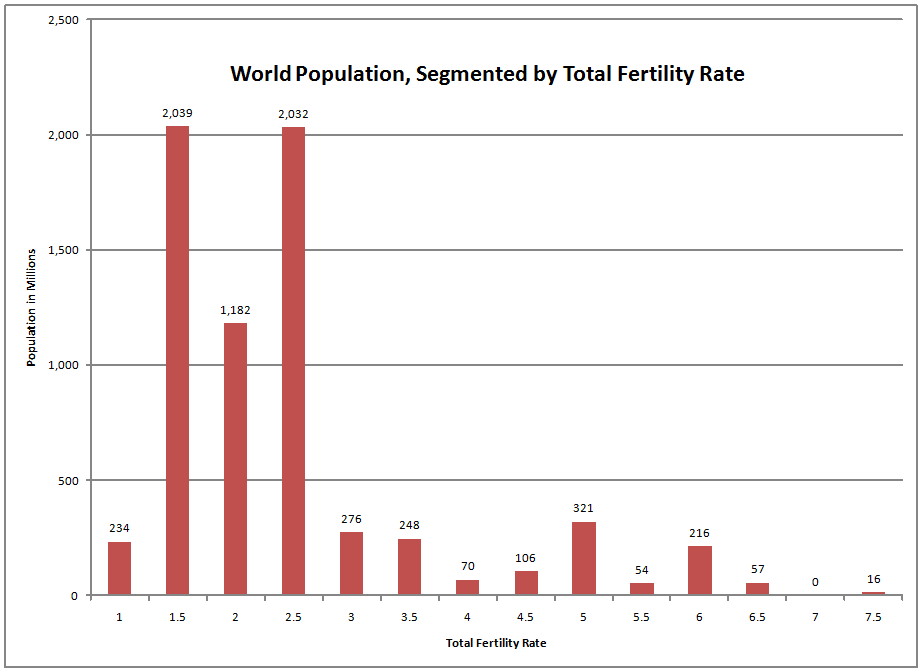When I gave a presentation to the Society of Actuaries three years ago, I was amazed that the Total Fertility Rate had fallen to 2.9 globally.? I am now amazed that the CIA Factbook estimates that rate at 2.5 for the world on average.
Background: recently I had a disagreement with my father-in-law who is brighter than me.? I alleged that global population growth was declining more rapidly than the politicians/activists were stating.? I suggested that global population would peak out around 2040 at a lower level than many suggest — less than nine billion.
He is brighter than me, but I am more street-smart.? Demographers are trailing indicators, and are slow to revise their forecasts.? There are many reasons why the total fertility rate is declining:
- Educating females makes many of them want to have fewer kids, whether the reason is pain, effort, wanting to work outside the home, etc.
- Contraception is more widely available.
- The marriage rate is declining globally.? Willingness to have children is positively correlated with marriage.
- Governments provide an illusion of support, commonly believed, that the government can support people in their old age, so people don’t have kids for old age support.
I don’t aim for controversy; it finds me as I try to explain reality.? But the most frosty time I have had in economics was 27 years ago, when I argued to my development economics class that people in the third world were rational in the number of kids that they had, because they had no way to save for their old age.? This was totally at variance with the development economics literature, but was utterly fact-based in terms of the way people behaved. (I got a friendlier reception preaching the Gospel on the UC-Davis quad.)? As people in developing countries have found more peace and stability, and markets allowing for long-term investment, family sizes have declined.
It is my assertion that estimates of peak global population will come sooner than most expect, and at lower levels.? But what would happen to the economy of a world where the total population peaks out and starts to decline? It will be a global Japan.? Per capita growth will slow, and those who are younger will find fewer opportunities to advance as oldsters hang onto their jobs longer.
Personally, I believe that mankind can overcome resource limits.? We’re smart, but we don’t figure out ways to overcome limits until we are forced to do so.? Thus I am not worried about overpopulation or shrinking population.


“I don?t aim for controversy; it finds me as I try to explain reality.” Now there’s a quote for you!
I wonder what the development economics crowd is thinking these days, if anything.
This is tangentially related to your article, but it’s the first thing I thought of. Keynes wrote about how the problem for man in the future would be how to spend time agreeably once their economic problems are solved. A copy is at –
http://www.econ.yale.edu/smith/econ116a/keynes1.pdf
If per chance you haven’t read it, the piece is well written and wise .
GSS data shows that higher ed reduces fertility for women dramatically while only slightly lowering it for men. The overall trend is a bit concerning. All educated people have less than necessary for replacement. All uneducated have enough. This is significantly more problematic that growing at unequal rates and could lead to social instability as the proportion of educable people drops as the less able rise.
GSS data
Educational attainment and fecundity in the US
http://anepigone.blogspot.com/2011/01/educational-attainment-and-fecundity-in.html
GSS:
http://www.norc.uchicago.edu/GSS+Website/